|
|
|
Sort Order |
|
|
|
Items / Page
|
|
|
|
|
|
|
| Srl | Item |
| 1 |
ID:
080989
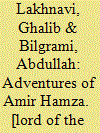

|
|
|
|
|
| Publication |
New Delhi, Random House India, 2007.
|
| Description |
xxix, 948p.Pbk
|
| Standard Number |
9788184000443
|
|
|
|
|
|
|
|
|
|
|
|
Copies: C:1/I:0,R:0,Q:0
Circulation
| Accession# | Call# | Current Location | Status | Policy | Location |
| 053123 | 891.43934/LAK 053123 | Main | On Shelf | General | |
|
|
|
|
| 2 |
ID:
172226
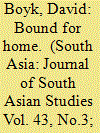

|
|
|
|
|
| Summary/Abstract |
At the turn of the twentieth century, a group of young men in Desna, a qasba (small town) in Bihar, founded an organisation called the Anjuman Al-Islah. There they shared their books in the name of promoting education and cultivation, which they saw as ‘paramount in life’s every undertaking’ and essential to the defence of qasbati culture. Through sustained collaborative efforts, the Anjuman soon built up an impressive library of Urdu books and periodicals. Where other libraries were assembled at the initiative of aristocratic patrons or government officials, the Al-Islah library relied on the contributions of numerous Desnavis, both those who still lived in the qasba and those whose careers had taken them far away. In turn, the Anjuman and its library nurtured Desnavis’ ties to each other and to their watan, or homeland.
|
|
|
|
|
|
|
|
|
|
|
|
|
|
|
|
| 3 |
ID:
185874
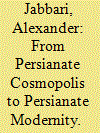

|
|
|
|
|
| Summary/Abstract |
This article examines twentieth-century Persian translations of Urdu-language works about Persian literature, focusing on two different Persian translations of an influential Urdu-language work on Persian literary history, Shiʿr al-ʿAjam (Poetry of the Persians), by Shibli Nuʿmani. The article offers a close, comparative reading of the Afghan and Iranian translations of Shiʿr al-ʿAjam in order to understand why two Persian translations of this voluminous text were published within such a short time period. These translations reveal how Indians, Afghans, and Iranians were invested in the same Persianate heritage, yet the emergence of a “Persianate modernity” undergirded by a cultural logic of nationalism rather than cosmopolitanism, along with Iran’s and Afghanistan’s differing relationships to India and Urdu, produced distinct approaches to translation.
|
|
|
|
|
|
|
|
|
|
|
|
|
|
|
|
| 4 |
ID:
172230
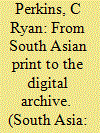

|
|
|
|
|
| Summary/Abstract |
This essay examines the challenges involving the creation of and access to digital content and those faced by smaller nineteenth-century publishers in South Asia. Rather than seeing the digital arena of online publishing as representing a break with preceding periods and technologies, this article argues that, as during the period of print’s expansion in colonial India towards the end of the nineteenth century, the digital arena is at its core an ongoing experiment in which legislation and regulations, readers, publishers, libraries, pirates and business interests continue to play off one another in a metaphorical dance through which the digital publishing landscape is created. For those in late colonial India who sought to enter the world of print and for contemporary efforts to make digitised materials available online alike, the quest for fiscal sustainability has been one of the greatest challenges. By combining an examination of the Urdu writer Abdul Ḥalīm Sharar’s (1860–1926) struggles in publishing the monthly periodical, Dil Gudāz, between 1887 and 1934 with the challenges faced by online archives today, this essay teases out parallels and differences. I argue that the ability of smaller presses to thrive in India in the late nineteenth and early twentieth centuries was dependent on a responsive public that accepted its newfound role as patrons, whereas in the present, private donations and grants are the crucial ingredients that can help ensure collaborations achieve their goals.
|
|
|
|
|
|
|
|
|
|
|
|
|
|
|
|
| 5 |
ID:
170676
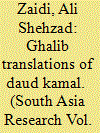

|
|
|
|
|
| Summary/Abstract |
Daud Kamal (1935–87), the preeminent English language poet of Pakistan, left behind many unpublished translations of poems by the classical Urdu poet Mirza Ghalib (1797–1869). This article presents and discusses several of these translations in the light of historical events during Ghalib’s lifetime. Although he endured many personal tragedies, Ghalib attained mystical heights that confirm his stature as the greatest Urdu poet.
|
|
|
|
|
|
|
|
|
|
|
|
|
|
|
|
| 6 |
ID:
143317
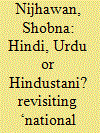

|
|
|
|
|
| Summary/Abstract |
Asking how the nationalist intelligentsia and Hindi literati sought to interact with and shape the new medium of radio in a period of time that witnessed the establishment of All India Radio’s Lucknow station in 1938, this article embeds colonial discussions of radio broadcasting into the cultural, literary and linguistic debates over Hindi, Urdu and Hindustani. The vibrant debate on the standardisation of Hindi, set against the background of All India Radio policies, is discussed from the perspective of those literary actors and institutions that envisioned diverse oral forms of Hindi and Hindustani for the rural and urban population residing in the Hindi belt and the rest of India. In addition, the article compares the radio broadcasting language to other contributions published in Hindi to show how languages operated not only in parallel but also in intersecting literary spheres. The article shows that language debates over radio broadcasting functioned as a site to probe the flexibility of what was to be officially projected as the language of the nation-to-be.
|
|
|
|
|
|
|
|
|
|
|
|
|
|
|
|
| 7 |
ID:
130728
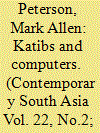

|
|
|
|
|
| Publication |
2014.
|
| Summary/Abstract |
In 1993, the prognosis for Urdu newspapers in north India was dismal. The readership was aging and dwindling as the new generation learned Hindi in Devanagiri script. Urdu calligraphers (katibs) were not passing their skills on to a new generation and writers skilled in Urdu were becoming increasingly hard to find. Fifteen years later, Delhi is home to a prosperous and expanding Urdu press. The number of newspapers had tripled, circulations were often higher than they had been in the past, profits were up and the atmosphere at Delhi's major Urdu newspapers was upbeat. A large part of the explanation lies in the intersection of language ideologies and new writing technologies. On the one hand, Urdu indexes crucial politically urgent populations, leading to a renewed interest in it from many sectors. On the other hand, new more flexible technologies allowed the retiring katibs to be replaced by computer typesetting that strongly resembles north Indian calligraphic styles and new software allows an entire daily newspaper to be assembled and sent to press using a single laptop. Drawing on ethnographic fieldwork in 1993 and 2008 at some of New Delhi's Urdu dailies and interviews with several editors, this article describes the mutual influences of Urdu language ideologies about Muslim identity and technological innovation in the revival of the Urdu daily.
|
|
|
|
|
|
|
|
|
|
|
|
|
|
|
|
| 8 |
ID:
141568
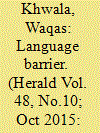

|
|
|
| 9 |
ID:
153018
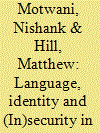

|
|
|
|
|
| Summary/Abstract |
This article revisits the Kashmir dispute by examining the interactions between language, religion and political dynamics to show how, in the post-1947 struggle, Kashmir's identity has increasingly been folded into the Indian and Pakistani language of a zero-sum conflict and nationalistic self-assertion. Paradoxically, Kashmir's position has weakened within a plural India even though Kashmir validates New Delhi's claim to religious and cultural heterogeneity. In Pakistan, Kashmir's diversity is dismissed because it disrupts Pakistan's unitary national identity centred on Islam and Urdu. By deliberately treating Kashmir as a homogenous Islamic entity, Pakistan seeks to attain legitimacy for its national imaginary as a pure Islamic state. Consequently, the capacity for Kashmir to actualise its own identity has diminished as it has been rendered hostage to the feuding of two behemoth ‘imagined communities’.
|
|
|
|
|
|
|
|
|
|
|
|
|
|
|
|
| 10 |
ID:
114018
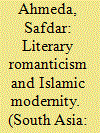

|
|
|
|
|
| Publication |
2012.
|
| Summary/Abstract |
In the nineteenth century, Muslim modernist reformers sought to ground an agenda for social and political rejuvenation in a return to the spirit of the early Muslim community. However, the influence of this quest for communal regeneration on theological discourses was, in some cases, less notable than its influence upon projects for cultural and social reform. One area of focus for Indian modernists of the nineteenth century was literature and the literary arts, including poetry, which were now deemed relevant to notions of cultural health, authenticity and decline. Under the dictum that a people's condition is reflected in their language, the themes of moral degeneration and reform came to have a strong bearing on the indigenous valuation of poetry and the literary arts, challenging the criteria upon which such literature was judged. In this paper, I will analyse how the modernist agenda for social reform led to the birth of a new literary romanticism in Urdu poetry.
|
|
|
|
|
|
|
|
|
|
|
|
|
|
|
|
| 11 |
ID:
117601
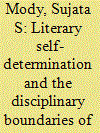

|
|
|
|
|
| Publication |
2012.
|
| Summary/Abstract |
This article examines Mahavir Prasad Dwivedi's project of literary self-determination, as articulated in two programmatic essays published in the Hindi journal Sarasvati under his editorship (1903-1920), scrutinising his construction of literature as a culturally embedded category of national consequence. His theorisation of Hindi literature as broadly inclusive in terms of its basic definition and function supported the growth of what he considered a national treasury of literature. His discussion of its historical and linguistic parameters and his emphasis on a prioritised plan of literary production, reified the notion of a modern discipline oriented towards a narrowly constructed national collective that sought to establish its sovereign identity via literature in Khari Boli Hindi. Though not explicit in its anti-colonial nationalism, this project nevertheless privileged Hindi as the projected lead language of a modern sovereign nation, with all the risks that delimitation entailed.
|
|
|
|
|
|
|
|
|
|
|
|
|
|
|
|
| 12 |
ID:
175481
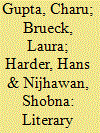

|
|
|
|
|
| Summary/Abstract |
This collection brings together nine essays, accompanied by nine short translations, that redraw the boundaries of literary histories both temporally and spatially. The essays, rooted in the humanities and informed by interdisciplinary area studies, explore multiple linkages between forms of print culture, linguistic identities and diverse vernacular literary spaces in colonial and post-colonial South Asia. The essays and translations foreground complex and politicised expressions of gender and genre in fictional and non-fictional print materials and thus draw meaningful connections between the vernacular and literature, the everyday and the marginals, and gender and sentiment. Collectively, they expand vernacular literary archives, canons and genealogies, and push us to theorise the nature of writing in South Asia.
|
|
|
|
|
|
|
|
|
|
|
|
|
|
|
|
| 13 |
ID:
175484
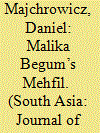

|
|
|
|
|
| Summary/Abstract |
Ostensibly, Muslim women in colonial India only rarely wrote travel narratives, particularly in Urdu. In truth, women’s travel writing in Urdu is anything but chimerical, but persistent archival and methodological limitations have led to the neglect and even irrevocable loss of this writing. A recalibrated approach to travel writing and archival practices divulges a vast corpus—but only if we attend to the specific ways in which women’s narratives were produced and circulated. This article offers a primary typology of the formats and fora most often employed by women writing in Urdu, including semi-private (but orally consumed) letters, family newspapers and women’s journals. Using extensive quotations from previously unknown sources, it reintroduces a forgotten corpus to the study of Indian history, literature, and gender studies alike.
|
|
|
|
|
|
|
|
|
|
|
|
|
|
|
|
| 14 |
ID:
113861
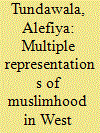

|
|
|
|
|
| Publication |
2012.
|
| Summary/Abstract |
This article maps the intricate topography of the ostensibly unified but veritably fractured Muslim search for identity in contemporary West Bengal. More specifically, it engages in a comprehensive, qualitative, interpretive investigation of the performance of two linguistically distinct Muslim literary traditions (Bengali and Urdu) in determining the context in which the community negotiates and asserts its identity. The interplay between 'religion', 'nation' and 'region' in the consciousness of Muslim literati and its implications for the religious/secular dimension of Muslim identity is researched in a quest to interrogate how and why the uniqueness of the West Bengal case, derived from history, still holds true. Literature and language, this article clearly confirms, serve as powerful tools for identity construction.
|
|
|
|
|
|
|
|
|
|
|
|
|
|
|
|
| 15 |
ID:
190722
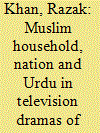

|
|
|
|
|
| Summary/Abstract |
The article explores the genealogies of Muslim cultural and Urdu language reform in late nineteenth century colonial India and traces its post-colonial trajectories in contemporary public culture in Pakistan. It does so by analysing the language and gender politics of Urdu in two Pakistani TV dramas, Aangan Terha (Crooked Courtyard), written by Anwar Maqsood and screened on the government-run Pakistan Television Corporation (PTV) channel in 1984, and Quddusi Sahab ki Bewah (The Widow of Mr. Quddusi), scripted by Faseeh Bari Khan, which was telecast on ARY Digital, a global private satellite channel, in 2012. The article emphasises the gendered language and performative politics of Urdu and respectability in colonial and post-colonial South Asia.
|
|
|
|
|
|
|
|
|
|
|
|
|
|
|
|
| 16 |
ID:
175485
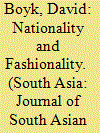

|
|
|
|
|
| Summary/Abstract |
The Persianate genre of the tazkira, or biographical compendium, typically concerns poets and Sufi saints, but a different approach is taken in Yadgar-e Rozgar, published in 1931 by Sayyid Badr al-Hasan, an aristocrat and honorary magistrate from Patna. Hasan focuses on the ordinary people—landlords and courtesans, doctors and bakers, lawyers and counterfeiters—who made up Patna’s social world as the city transformed from a provincial town into the capital of a new province. While many Patnaites celebrated these changes, Hasan was deeply ambivalent about the dilemmas of colonial modernity. He struggled to reconcile modernist ideals with his sense that older ways were essential to Patna’s cohesion and distinctiveness. As he worriedly put it, ‘Asian breeding’ had been replaced by a fickle disregard for social norms, as ‘nationality’ increasingly gave way to ‘fashionality’.
|
|
|
|
|
|
|
|
|
|
|
|
|
|
|
|
| 17 |
ID:
141664
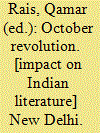

|
|
|
|
|
| Publication |
New Delhi, Sterling Publishers Pvt Ltd, 1978.
|
| Description |
xiii, 136p.pbk
|
|
|
|
|
|
|
|
|
|
|
|
Copies: C:1/I:0,R:0,Q:0
Circulation
| Accession# | Call# | Current Location | Status | Policy | Location |
| 017424 | 947.0841/RAI 017424 | Main | On Shelf | General | |
|
|
|
|
| 18 |
ID:
103685
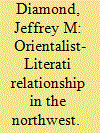

|
|
|
|
|
| Publication |
2011.
|
| Summary/Abstract |
Lahore emerged as a new intellectual centre in northwest India for British Orientalists and Indian intellectuals after the destruction of Delhi during the Great Revolt of 1857. Two prominent individuals who moved to Lahore at this time were Gottlieb Leitner, a philologist and Orientalist scholar, and Maulana Muhammad Hussain Azad, an Urdu poet, literary critic and teacher. Leitner, a naturalised British citizen who studied in Istanbul and completed higher education in Arabic and Turkish in London, became principal of the new Government College in Lahore in 1864. In this position, he exercised a deep influence on education in the northwest by promoting the development and study of vernacular (Urdu language) education, founding and leading a major scientific and literary organisation, the Anjuman-e Punjab. Having aroused strong British opposition, both to his ideas and his combative personality, Leitner's support and assistance from the local literati allowed him to develop and implement his ideas. Leitner's most significant partner was Muhammad Hussain Azad, also a new arrival to Lahore after fleeing Delhi in 1857. Leitner and Azad worked together in the Anjuman-e Punjab to promote their literary and social concerns. They became advocates of neo-Orientalist educational reforms through their public speeches and writing, including works in Urdu intended for, among others, the education of Maulvis. The bracketing of these European and Indian partners is conceptualised in this article through their roles as members of their respective communities as well as outsiders to these very communities. The analysis shows how their complex identities helped them to become highly influential figures in the new cultural environment of post-1857 Lahore.
|
|
|
|
|
|
|
|
|
|
|
|
|
|
|
|
| 19 |
ID:
172227
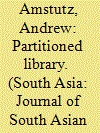

|
|
|
|
|
| Summary/Abstract |
This article argues that the history of a damaged Urdu library in Delhi reveals new perspectives on the ways in which prominent Indian Muslim scholars dealt with the violent displacements of the 1947 Partition of British India and imagined new futures for the Urdu language across the borders of India and Pakistan. The library of the Anjuman-e Taraqqi-e Urdu (Association for the Advancement of Urdu), an influential Urdu literary association, was damaged during the violence following Partition in August 1947. In contrast to the relative absence of official commemorations of Partition in post-colonial South Asia, the Anjuman’s leaders documented and publicised the violence of Partition on their library. Moreover, these Urdu scholars used the material process of restoring the damaged library in 1947 and 1948 to rethink the role of the library as a repository to preserve evidence of the continuing production of Urdu knowledge in India. In turn, the disputed division of the library in 1949 illuminates competing visions for Urdu’s future in India, Pakistan, and beyond. This story of one Urdu library demonstrates how changing library collecting priorities and material practices shaped broader debates over Urdu’s place in twentieth-century South Asia.
|
|
|
|
|
|
|
|
|
|
|
|
|
|
|
|
| 20 |
ID:
139685
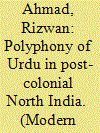

|
|
|
|
|
| Summary/Abstract |
Many scholars, politicians, and the lay people alike believe that Urdu in North India symbolizes a Muslim identity and culture. Based on an eight-month long ethnographic study and quantitative language data collected in Old Delhi, this article challenges this notion and shows that the symbolic meanings of Urdu have been mutating in post-colonial India. A cross-generational study involving both Muslims and Hindus shows that different generations assign different meanings to Urdu. Unlike the older generation, Muslim youth do not identify themselves with Urdu. A study of the Urdu sounds /f/, /z/, /kh/, /gh/, and /q/ in the speech of Muslim youth further demonstrates that they are losing three of these sounds. Another transformation involves the adoption of the Devanagari script to write Urdu by many Muslims. This change in the literacy practices of Muslims reinforces the shift in the symbolic meanings of Urdu. I argue that the transformation in the symbolic meanings of Urdu is reflective and constitutive of the sociopolitical changes that Muslims have undergone in the twentieth century.
|
|
|
|
|
|
|
|
|
|
|
|
|
|
|
|
|
|
|
|
|